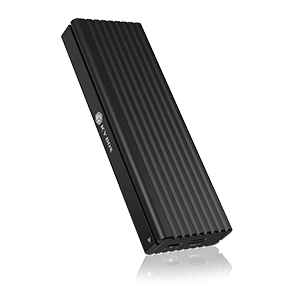- Joined
- Nov 25, 2013
- Messages
- 7,776
Hi all,
you know I would not recommend using USB for anything but boot, and then you have to pick your hardware carefully so it lasts.
Anyway, I have two NVMe to USB enclosures, really solid hardware, that I use as temporary "data tombs" for my Macbook Pro. I am not perfectly sure about the version/generation but they are similar to this current thingy:

 icybox.de
icybox.de
Insert M.2 SSD, connect via USB-C, enjoy. Passive cooling really good.
Now being the ZFS fanboy that I am I installed ZFS on OS X on my Mac and both devices are "formatted" with ZFS. Today I wanted to do a complete copy of the zpools. My wired network is Fast Ethernet only, and the WiFi is faster, but still USB 3 should be able to beat that. So I connected them directly to my TN CORE system running 13.1 nightly (my production 13.0 would not import the pool due to missing feature flags).
Then I did a zfs scrub ...
The devices ran so hot during that operation one of them was "SUSPENDED" by ZFS. I could not even terminate the scrub or export the pool again. The whole scrub operation was running for short of half an hour at that time.
I had to pull the plug and reboot the TrueNAS system to get into a working state again.
Now, when I connected the same devices to my Mac, neither zfs scrub nor regular use posed any problem ever. After that unexpected behaviour I just did reconnect them to my Mac, did a zfs scrub - five minutes tops, devices hand warm - and now I am transferring the data over WiFi which will take a couple of hours but at least not fry my SSDs.
Does anyone who knows "USB" have any idea why the same device runs hot to the point of failing on one USB connection while running perfectly fine on another?
Thanks!
Patrick
you know I would not recommend using USB for anything but boot, and then you have to pick your hardware carefully so it lasts.
Anyway, I have two NVMe to USB enclosures, really solid hardware, that I use as temporary "data tombs" for my Macbook Pro. I am not perfectly sure about the version/generation but they are similar to this current thingy:

IB-1817MCT-C31 | ICY BOX - Create Your Workspace
NVME & SATA: Das ICY BOX IB-1817MCT-C31 ist die richtige Wahl für Ihre M.2 SSD. Unser Gehäuse ist kompatibel mit NVMe und SATA SSDs gleichermaßen und bietet Platz für Speicher in den gängigen Größen bis zu 2280
Insert M.2 SSD, connect via USB-C, enjoy. Passive cooling really good.
Now being the ZFS fanboy that I am I installed ZFS on OS X on my Mac and both devices are "formatted" with ZFS. Today I wanted to do a complete copy of the zpools. My wired network is Fast Ethernet only, and the WiFi is faster, but still USB 3 should be able to beat that. So I connected them directly to my TN CORE system running 13.1 nightly (my production 13.0 would not import the pool due to missing feature flags).
Then I did a zfs scrub ...
The devices ran so hot during that operation one of them was "SUSPENDED" by ZFS. I could not even terminate the scrub or export the pool again. The whole scrub operation was running for short of half an hour at that time.
I had to pull the plug and reboot the TrueNAS system to get into a working state again.
Now, when I connected the same devices to my Mac, neither zfs scrub nor regular use posed any problem ever. After that unexpected behaviour I just did reconnect them to my Mac, did a zfs scrub - five minutes tops, devices hand warm - and now I am transferring the data over WiFi which will take a couple of hours but at least not fry my SSDs.
Does anyone who knows "USB" have any idea why the same device runs hot to the point of failing on one USB connection while running perfectly fine on another?
Thanks!
Patrick


